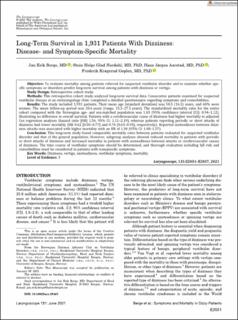Long-Term Survival in 1,931 Patients With Dizziness: Disease- and Symptom-Specific Mortality
Journal article, Peer reviewed
Published version

Åpne
Permanent lenke
https://hdl.handle.net/11250/2823385Utgivelsesdato
2021Metadata
Vis full innførselSamlinger
- Department of Clinical Medicine [2066]
- Registrations from Cristin [9791]
Sammendrag
Objective: To evaluate mortality among patients referred for suspected vestibular disorder and to examine whether specific symptoms or disorders predict long-term survival among patients with dizziness or vertigo.
Study Design: Retrospective cohort study.
Methods: This retrospective cohort study analyzed long-term survival data. Consecutive patients examined for suspected vestibular disease at an otolaryngology clinic completed a detailed questionnaire regarding symptoms and comorbidities.
Results: The study included 1,931 patients. Their mean age (standard deviation) was 50.5 (16.5) years, and 60% were women. The mean follow-up period was 20.6 years (range, 15.3–27.5 years). The standardized mortality ratio for the entire cohort compared with the Norwegian age- and sex-matched population was 1.03 (95% confidence interval [CI]: 0.94–1.12), illustrating no difference in overall survival. Patients with a cerebrovascular cause of dizziness had higher mortality in adjusted Cox regression analyses (hazard ratio [HR] 1.56, 95% CI: 1.11–2.19), whereas patients reporting periodic or short attacks of dizziness had lower mortality (HR 0.62 [0.50–0.77] and 0.76 [0.63–0.93], respectively). Reported unsteadiness between dizziness attacks was associated with higher mortality with an HR of 1.30 (95% CI: 1.08–1.57).
Conclusion: This long-term study found comparable mortality rates between patients evaluated for suspected vestibular disorder and that of the general population. However, subgroup analyses showed reduced mortality in patients with periodic or short attacks of dizziness and increased mortality in patients with unsteadiness between attacks or cerebrovascular causes of dizziness. The time course of vestibular symptoms should be determined, and thorough evaluation including fall risk and comorbidities must be considered in patients with nonepisodic symptoms.
